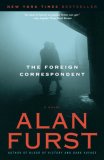Summary | Excerpt | Reviews | Beyond the Book | Readalikes | Genres & Themes | Author Bio

A Novel
by Alan FurstIn Paris, the
last days of autumn; a gray, troubled sky at daybreak, the fall of twilight
at noon, followed, at seven-thirty, by slanting rains and black umbrellas as
the people of the city hurried home past the bare trees. On the third of
December, 1938, in the heart of the Seventh Arrondissement, a
champagne-colored Lancia sedan turned the corner of the rue Saint-Dominique
and rolled to a stop in the rue Augereau. Then the man in the backseat
leaned forward for a moment and the chauffeur drove a few feet further and
stopped again, this time in the shadow between two streetlamps.
The man in the back of the Lancia was called Ettore, il conte Amandola--the
nineteenth Ettore, Hector, in the Amandola line, and count only the grandest
of his titles. Closer to sixty than fifty, he had dark, slightly bulging
eyes, as though life had surprised him, though it had never dared to do
that, and a pink flush along his cheekbones, which suggested a bottle of
wine with lunch, or excitement in the anticipation of an event planned for
the evening. In fact, it was both. For the rest of his colors, he was a very
silvery sort of man: his silver hair, gleaming with brilliantine, was
brushed back to a smooth surface, and a thin silver mustache, trimmed daily
with a scissors, traced his upper lip. Beneath a white wool overcoat, on the
lapel of a gray silk suit, he wore a ribbon holding a silver Maltese cross
on a blue enamel field, which meant he held the rank of cavaliere in the
Order of the Crown of Italy. On the other lapel, the silver medal of the
Italian Fascist party; a tipped square with diagonal fasces--a bundle of
birch rods tied, with a red cord, to an axe. This symbolized the power of
the consuls of the Roman Empire, who had the real rods and axe carried
before them, and had the authority to beat with the birch rods, or behead
with the axe.
Count Amandola looked at his watch, then rolled down the rear window and
peered through the rain at a short street, the rue du Gros Caillou, that
intersected the rue Augereau. From this point of observation--and he had
twice made sure of it earlier that week--he could see the entry of the Hotel
Colbert; a rather subtle entry, only the name in gold letters on the glass
door, and a spill of light from the lobby that shone on the wet pavement. A
rather subtle hotel, the Colbert, quiet, discreet, that catered to les
affaires cinq-a-sept; amours conducted between five and seven, those
flexible hours of the early evening. But, Amandola thought, a little taste
of fame for you tomorrow. The hotel commissionaire, holding a large
umbrella, left the entry and headed briskly down the street, toward the rue
Saint-Dominique. Once more, Amandola looked at his watch. 7:32, it said. No,
he thought, it is 1932 hours.
For this occasion, twenty-four-hour time, military time, was obviously the
proper form. He was, after all, a major, had taken a commission in 1915,
served in the Great War, and had the medals, and seven lavishly tailored
uniforms, to prove it. Served with distinction--officially recognized--in
the purchasing office of the Ministry of War, in Rome, where he had given
orders, maintained discipline, read and signed forms and letters, and made
and answered calls on the telephone, his military decorum scrupulous in
every way.
And so it had remained, since 1927, in his tenure as a senior official in
the Pubblica Sicurezza, the department of Public Security of the Ministry of
the Interior, set up by Mussolini's chief of national police a year earlier.
The work was not so different from his job during the war; the forms, the
letters, the telephone, and the maintenance of discipline--his staff sat at
attention at their desks, and formality was the rule in all discourse.
1944 hours. Rain drummed steadily on the roof of the Lancia and Amandola
pulled his overcoat tighter, against the chill. Outside on the sidewalk, a
maid--under her open raincoat a gray-and-white uniform--was pulled along by
a dachshund wearing a sweater. As the dog sniffed at the pavement and began
to circle, the maid squinted through the window at Amandola. Rude, the
Parisians. He did not bother to turn away, simply looked through her, she
did not exist. A few minutes later, a black square-bodied taxi pulled up to
the entry of the Colbert. The commissionaire hopped out, leaving the door
open, as a couple emerged from the lobby; he white-haired, tall and stooped,
she younger, wearing a hat with a veil. They stood together under the
commissionaire's umbrella, she raised her veil and they kissed
passionately--until next Tuesday, my beloved. Then the woman climbed into
the taxi, the man tipped the commissionaire, raised his own umbrella, and
strode around the corner.
Excerpted from The Foreign Correspondent by Alan Furst Copyright © 2006 by Alan Furst. Excerpted by permission of Random House, a division of Random House, Inc. All rights reserved. No part of this excerpt may be reproduced or reprinted without permission in writing from the publisher






Your guide toexceptional books
BookBrowse seeks out and recommends the best in contemporary fiction and nonfiction—books that not only engage and entertain but also deepen our understanding of ourselves and the world around us.